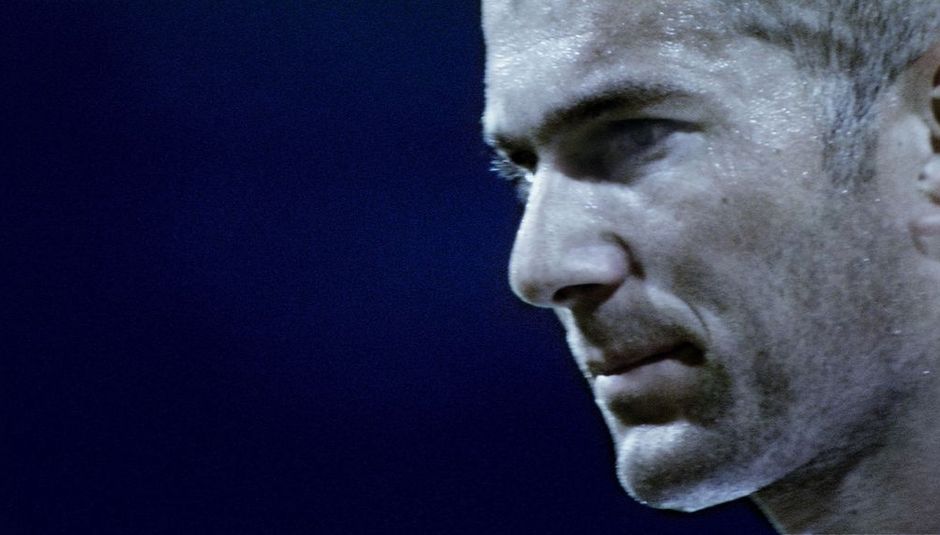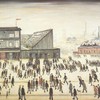It’s always lyrics.
Whenever someone tries to bridge the gap between music and some other blob of culture or art it’s usually the words that are leaned on first for answers. Words are easy for us to understand and talk about using, well, other words, especially compared to the abstractions of sounds and textures, and how they translate to the slippery concepts that exist beneath the surface in other fields.
The relationship between football and music often suffers from this complacency to reach for references that are already obvious and self-evident, from John Barnes rapping to Kevin Keegan’s double-life as a 1970s chart popstar. It’s rare for argument or analysis to try and drill down much deeper than that.
With this in mind I headed to the Barbican Centre in central London last month to interview Stuart Braithwaite of Scottish post-rock stalwarts Mogwai, a band whose music can often be instrumental and therefore lyricless. In 2005 Mogwai were approached by Turner Prize winning artist Douglas Gordon to compose the soundtrack to a cinematic portrait of French footballer Zinedine Zidane he was working on with Philippe Parreno. A full transcript of the interview can be found at The False Nine.
Part art film, part documentary, Zidane: A 21st Century Portrait focuses solely on the presence and actions of midfielder throughout a full match between his Real Madrid side and then La Liga rivals Villarreal in 2005. The film follows on from Football As Never Before, another football cinematic portrait made by the acclaimed German filmmaker Hullmuth Costard in 1970. His subject was the Manchester United winger and talisman George Best, who remained at all times in shot even as the game flowed off to the other end of the pitch. Gordon and Parreno took a similar approach to capturing Zidane. In fact, before filming began they took their film crew on a tour of the famous Prado Museum in Madrid to look upon the portraiture of artists such as Goya and Velásquez, in the hope of bringing their sense of framing and visual composition to their lenses and camera techniques.
Descending into the backstage basement area of the Barbican I wasn’t sure what to expect. I knew Stuart was a fan of football – a supporter of Celtic at that – but broaching the idea of treating football as some sort of comparable cultural medium to music or the arts can be a risky and ridiculous notion to air at the best of times. Thankfully, Stuart was more than accommodating to my line of questioning. How much, I asked, did the football of Zidane inspire the band’s soundtrack?
‘It was more the atmosphere of the film. I think the fact that he’s a really famous, amazing footballer is kind of incidental in the scheme of the film. The film is more about a person – a guy – working. It doesn’t really glamorise him or anything like that. It makes you think of him just as a – very talented obviously – someone doing his job as well as he can. When we did the music, we really just tried to be ourselves really.'
Initially reluctant to work on the film, the band changed their mind after Gordon produced some test footage featuring a remix of their track Mogwai Fear Satan. The combination of the film’s visuals and their music did the trick of persuading them to get involved ('We’d seen the rough footage of the film with some of our old music, and it worked, so we just knew that it was going to work.’).
‘It had a real sense – a real ominous sense of something quite heavy happening. It was over the part where he gets sent off at the end, so you could feel the intensity. But there’s a weird bit in that, because I’ve seen it so many times over the last few weeks, where he starts having a laugh with Roberto Carlos. He kind of has a little skirmish and then he’s having a laugh – he’s probably saying to Roberto Carlos, “watch this, I’m going to get sent off because they’re make a film about me.”
‘I remember [when Zidane was sent off in the 2006 World Cup final against Italy] a lot of the press here were like, “it’s so uncharacteristic”, and Douglas, who’d obviously been following him around for years, was like, “nah, he used to get sent off all the time. He was always losing his rag.” He wasn’t at all surprised, and it was good publicity for the film when that happened.’
Talking more generally about music and football, I put to him that it’s usually bands such as Kasabian who are held up to represent some sort of laddish caricature of football chants, fans and terrace culture. Increasingly though, Mogwai’s music has been working its ways into montages for Euro 2012 and other football highlights. What did he think about his music being used alongside football in a way that was interacting more with the emotions and dramatic moments of the game?
‘I’m pretty happy to be honest. I’m pretty happy with our music being used in anything. I’m a football fan, I like football, and actually one of my favourite uses of one of our songs was in a trailer for one of the Scottish international games. It was just one of our really heavy songs set to a montage of brutal tackles. I quite enjoyed that […] I think our music is quite open ended. People can interpret it however they want. Some of it can be emotional too, so if you’re talking about your big finals, it can add a sense of occasion to it.
Is post-rock more suited to football than other styles of music? With the way many bands that fit into the genre write music that builds and releases momentum, with ebbs and flows, was there some sort of parallel with the way a full ninety minute football match develops?
‘It has that element. Yeah, it definitely does. I can see that, and I thought about that quite a lot when we were organising this concert and deciding where to play because in the actual film there’s not an awful lot of music. We actually used a lot of music that they didn’t use in the film, so when we were deciding that you realise, there’s a lot of lulls in the game where nothing happens. It’s probably just people getting their breath back or regrouping after losing or after they’ve lost a goal – there’s definitely a story to every game.
‘[Matches and gigs are] about the same length as well. One of the reasons they decided to make Zidane the film was that when they were talking about doing something about him they realised that the cinema screen is the same shape of a football pitch, and a film about the same length of a game.’
Perhaps then music is underused in football. Would Mogwai be interested in taking the interaction between their music and the film a step further? How would they feel about and approach scoring, say, a full unedited 90 minutes of football without commentary?
‘I don’t know. I think because football is such a mainstream part of everything in this country, your musical equivalent is not that sophisticated. Even the normal songs you’ll hear at a football game, it’s Queen or the Black Eyed Peas. It’s pop, chart and rock music. I think the sub-culture of people taking things a bit more seriously is slightly below the surface, but it is there.'
'We tend to just do our own thing until someone asks us to do something, so if someone asked very nicely, you never know. It’d be interesting but you’d really hope it wasn’t a 0-0, with no bookings!’
When it comes to Zidane specifically though, I wondered if the film could instead have focussed on a less celebrated and refined character from the world of football. I asked Stuart about how successful he thought the film was as a portrait of Zidane and whether it would work with a different subject.
‘I think it’s great. The music and the football are almost secondary, like I said it’s really all just about the person, but I don’t think people would have much interest much interest in the person if it wasn’t for his job, who he was and what he did. You need the subtext. You need to know there’s something going on beneath the surface. Joey Barton though, that might be pretty good. I loved hearing him with his Allo Allo French accent, especially since [he] paints himself as being some sort of intellectual because he’s read a few books. You’d think he would be aware enough to realise that [in comedy French accent], “and now I will play… on ze left wing…” sounds absolutely bloody ridiculous.’
Moving on to the team Stuart supports, Celtic, it was interesting to consider whether his choice of club – a side who at least historically are fairly well-regarded for their contributions to attractive, attacking football – played any part in how open he was to considering the game on some sort of aesthetic or expressive level?
‘Yeah, and I do like that about football. I’ve always been a fan of the really attractive teams like Spain, Barcelona and all that kind of stuff. Our label manager, who doesn’t support Celtic, he’s much more into his defensive teams. He’s like a really massive Mourinho fan. That doesn’t really appeal to me that much – I can respect that but it doesn’t appeal to me. I think there’s always been a tradition, and Celtic have always had some attractive players. Even when they haven’t been doing so well, there’s always been one or two players you’d like to watch. They always try and be watchable.
‘There’s a large amount of people in the arts in Scotland who are Celtic supporters, and there’s a lot of pontificating about why that is. I think that that’s probably because they’re the anti-establishment team. There’s always been something more. It doesn’t even necessarily come from the club, but the ethos around the club. It’s a bit more socialist, a bit more against the grain, and I think that attracts more of your musicians and artists.’
‘Certain teams that have of a sort of community or social aspect to them, you can feel the expectation and the shared joy, loss and all that sort of stuff. There’s a lot of interesting things about football that people who don’t like football don’t understand. It’s funny, my girlfriend doesn’t know anything about it at all but she came to a game with me and she got it straight away. She was like, “this is about something more, this is about a community and a shared experience and all sorts of things”.’
On the subject of Scottish football, which at one time provided some of the most talented, intelligent and tricky players for the English leagues south of the border, I wondered if there was anything in the similar situation to the country’s musicians. As well as Mogwai, artists such as Arab Strap, Boards of Canada and even Biffy Clyro to some extent have put out some great music that often slips just under the radar, classified as “alternative”. I thought of David Winner’s book on Dutch football and culture, Brilliant Orange, in which he proposes that the Dutch tradition of conceptualising and manipulating space – encouraged by the necessity to build dikes and polders to prevent flooding – that feeds into their architecture and art may also influence their footballers. Is there a similar common thread that unites Scottish pop culture in its football and music?
‘I think it’s possibly true. One of the defining things about people in Scotland is the things they’re passionate about, perhaps football more so. People like to see good football. And the weird thing is that even though the Scottish teams and players seem to be declining, or aren’t as strong as they once were, there seems to be a real renaissance for really strong Scottish managers. They’re all quite philosophical about what they want to do and how they see the game; and they’re quite outspoken about these things. I mean, was it not the season before last something like half the teams in the Premier League had Scottish managers?’
Finally, I approached the question that lay at the heart of the discussion. What did he think of the idea of placing football on a similar level to cinema, music and other art forms?
‘At the end of the day it’s a sport and a business, which is very different to art, but one of the reasons I got really drawn towards football was that it’s so certain. There’s going to be a certain outcome, there’s going to certain consistencies – a team playing in that colour are going to play there every two weeks, until the end of time. Whereas with music, you can’t be certain, and that’s something great too, but I also love the exact opposite of that: I love the certainty and the permanence of it, as compared to music and everything.
‘I think on an individual basis, these people are artists. Maradona, Messi; they’re amazing. One of my favourite Celtic players was Lubomír Moravcík who was one of Zidane’s favourite players, and it was like watching something amazing happening every time you saw him play. The unpredictability, the imagination: the same thing that’s great about great musicians, but being expressed in a completely different way.’
Ascending from the depths of the dressing rooms and briefly back into the light, I took my seat in the main performance hall to watch the Mogwai perform. Having practised the score extensively in preparation for the tour, which had already taken in shows in Glasgow and Manchester, the music was faultless, leading to the band becoming almost insignificant onstage. The music and visuals fused together and your eyes were drawn up to hone in on the projector screen raised behind them.
Like a live football match, the sound was intense, yet Stuart was right: this wasn’t necessarily a film about football. Zidane trotted across the turf, framed with swathes of space to his sides, like a foreman patrolling and inspecting a work site. The centre of the pitch felt like a work station until the ball and the match action careered back into shot. Perhaps this was one of the facets of football that first attracted those early audiences, seeking entertainment and enjoyment in the smoggy industrial cities of the 19th century: a relatable sense of hard work and industry giving birth to exquisite moments of skill and delight. Maybe that’s part of what continues to draws us into more ambient and “open ended” pieces of music today – the need to invest in time and effort for the satisfactions of the pay off, through the empty space, build up and the down-time.
Mogwai have returned to Castle Doom studios in Glasgow to record their follow-up to Hardcore Will Never Die, But You Will, and it’d be unwise to hold breath over the potential for more football-music collaborations from the band. But is there some potential there left untapped that other artists may one day try to exploit in the space shared by music and the world’s most popular game? If Lowry could find inspiration in the match day crowds of the North West, and Picasso was able to distil the form of a footballer into his sculpture Footballeur, it may only be a matter of time before music makes in-roads into the sport beyond the cosmetics of the lyric sheet.
Greg will return with another Some Goals Are Bigger Than Others column in October.
You can also follow Greg and The False Nine on Twitter.
Upcoming Mogwai Live Dates
NOVEMBER
28 - The Junction, Cambridge (Tickets)
DECEMBER
1 - All Tomorrow's Parties, Camber Sands (Tickets)
JANUARY
24 - Royal Festival Hall, London (Tickets onsale 10am 16th August)
30 - Paradiso, Amsterdam (Tickets onsale17th August)
FEBRUARY
1 - Ancienne Belgique, Brussels (Tickets onsale 13th August - 11am)
3 - Olympia, Paris (Tickets onsale 19th August - 9am)
4 - Batschkapp, Frankfurt (Tickets)
5 - Freiheiz, Munich
6 - Tempodrom, Berlin
More info at: mogwai.co.uk






















